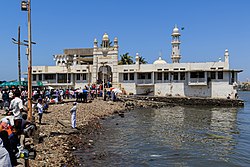Haji Ali
| Haji Ali Dargah | |
|---|---|
 |
|
| Coordinates: 18°59′06″N 72°48′36″E / 18.985°N 72.81°ECoordinates: 18°59′06″N 72°48′36″E / 18.985°N 72.81°E | |
| Country | India |
| State | Maharashtra |
| Metro | Mumbai |
The Haji Ali Dargah is a mosque and dargah (tomb) located on an islet off the coast of Worli in the southern part of Mumbai. Near the heart of the city proper, the dargah is one of the most recognisable landmarks of Mumbai.
An exquisite example of Indo-Islamic Architecture, associated with legends about doomed lovers, the dargah contains the tomb of Sayed Peer Haji Ali Shah Bukhari.
The Haji Ali Dargah was constructed in 1431 in memory of a wealthy Muslim merchant, Sayyed Peer Haji Ali Shah Bukhari, who gave up all his worldly possessions before making a pilgrimage to Mecca. Hailing from Bukhara, in present-day Uzbekistan, Bukhari travelled around the world in the early to mid 15th century, and eventually settled in present-day Mumbai.
According to legends surrounding his life, once the saint saw a poor woman crying on the road, holding an empty vessel. He asked her what the problem was, she sobbed that her husband would thrash her as she stumbled and accidentally spilled the oil she was carrying. He asked her to take him to the spot where she spilt the oil. There, he jabbed a finger into the soil and the oil gushed out. The overjoyed woman filled up the vessel and went home.
Later, Pir Haji Ali Shah Bukhari had a recurring and disturbing dream that he had injured Earth by his act. Full of remorse and grief from that day he became very serious and was not keeping well. Then with the permission of his mother he traveled to India with his brother and finally reached the shore of Mumbai – near Worli or at some place opposite the present tomb. His brother went back to their native place. Pir Haji Ali Shah Bukhari sent a letter with him to their mother informing her that he was keeping good health and that he had decided to reside at that place permanently for the spread of Islam and that she should forgive him.
Till his death he kept spreading knowledge about Islam to the people and his devotees would regularly visit him. Before his death he advised his followers that they should not bury him at any proper place or graveyard and should drop his shroud ('kafan') in the ocean such that it should be buried by the people where it is found.
His wish was obeyed by his followers. That is why the Dargah Sharief is built at the very site where his shroud came to rest in the middle of the sea where it perched on a small mound of rocks rising above the sea. The Tomb and Dargah Sharief were built in the years to come.
...
Wikipedia

